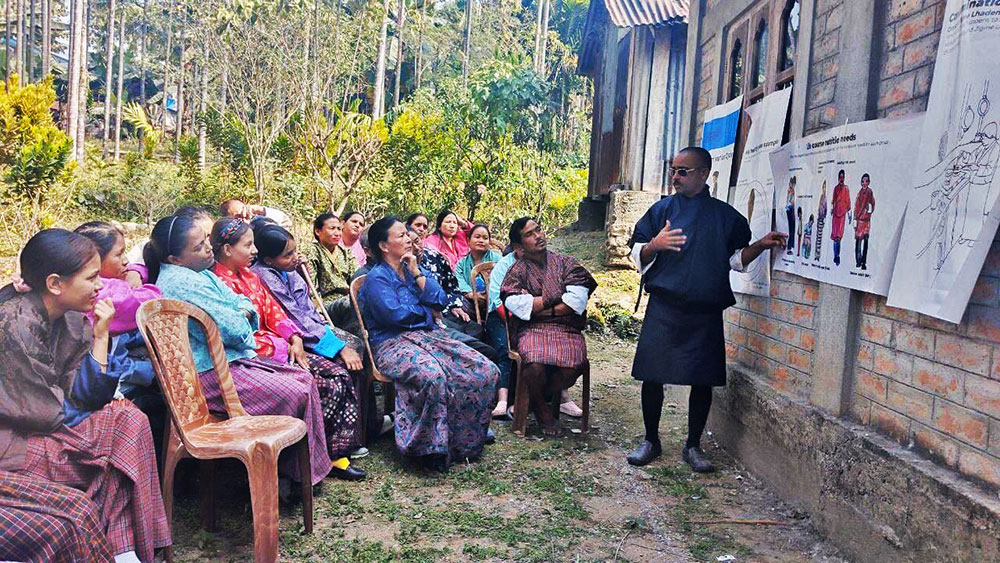Lhakpa Quendren
JIGMELING — Pema Lethro, a 37-year-old resident has undertaken a transformative endeavour. On a modest five decimals of land, he has established a thriving nutrition garden that now supplies an abundance of vegetables to nourish his family of four.
Pema, who also serves as a dedicated Community Resource Person (CRP) in his chiwog, is playing a pivotal role in driving healthier dietary habits as part of the Food Security and Agriculture Productivity Project (FSAPP), spearheaded by the agriculture department under the Ministry of Agriculture and Livestock.
The genesis of Pema’s journey into horticulture began in 2012, when he set up a greenhouse garden not only for personal consumption but also for potential commercial purposes. With unwavering determination, he expanded his cultivation efforts to create a dedicated nutrition garden for his family, eliminating the need for external purchases.
“I share the valuable insights we learn from the training to supplement their knowledge. It is not only important to have a kitchen garden but also to understand what nutritious vegetables should be grown,” Pema said.

A community resource person talks about nutrition gardens
Pema’s altruistic spirit extends beyond his own plot, as he plans to establish social media groups on platforms like WeChat and WhatsApp, fostering a community-driven approach for regular updates and feedback.
Shanti Devi Rai, 32, another passionate CRP from Samtenling, echoes the sentiment of knowledge deficiency prevalent in her community. Despite the existence of kitchen gardens, many lack a nuanced understanding of cultivating specific vegetable and fruit varieties, as well as their inherent health benefits.
“I have gained knowledge of our dietary habits after attending the training. We grow organic vegetables such as carrot, garlic, chillies, cabbage, and cauliflower, which are all free of chemicals,” Shanti said.
A cohort of 33 identified CRPs from five gewogs—Tareythang, Umling, Samtenling, Dekiling, Shompangkha, and Gakiling—have undergone specialized training in behavioural change communication (BCC), a pivotal tool in advocating for nutrition gardens and addressing the escalating concerns over food-related diseases.
In a recent day-long training session, these grassroots champions familiarised themselves with a handbook to be submitted as a simple report to the project. The CRPs are now positioned to encourage others to establish their own nutrition gardens, fostering a self-sustaining cycle of healthy eating.
Kinley Namgay, Sarpang’s agriculture officer, envisions a cascading impact, as each CRP is entrusted with the task of extending awareness to at least 25 households within their respective chiwog.
“The change may not be immediate, but going forward, I am certain that our people will adopt and practise the initiative in a sustainable manner,” Kinley said.
As a testament to the project’s success, numerous farmers have ventured into open-air organic kitchen gardens, marking a shift away from reliance on readily-available imported produce. The initiative aligns seamlessly with Bhutan’s commitment to bolster food security through homegrown solutions.
Rinzin Wangchuk, the FSAPP programme director, elaborated on the holistic vision of behavioural change communication, emphasising the promotion of nourishing eating habits and nutrition-related behaviour.
“From the food security point of view, we are creating awareness in the community that you have to produce nutritious foods and consume nutritious foods,” Rinzin said.
This grassroots initiative dovetails with the broader plans, policies, and programmes of Bhutan’s agriculture department, ministry, and government.
Nutrition gardens, often referred to as kitchen gardens, serve as an educational cornerstone, enlightening communities about the transformative power of cultivating fresh, local produce to enhance health and well-being.
The initiative beckons farmers to diversify their crops, embracing a colourful array of vegetables such as carrots, broccoli, beans, saag, tomatoes, and chillies, all aimed at nurturing a healthier and more resilient society.


